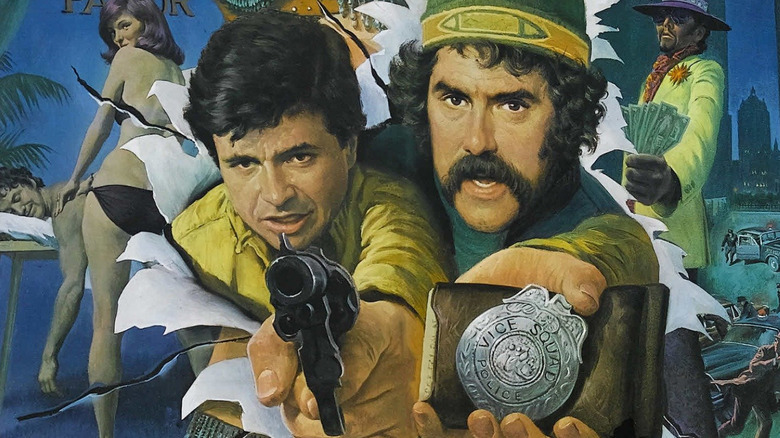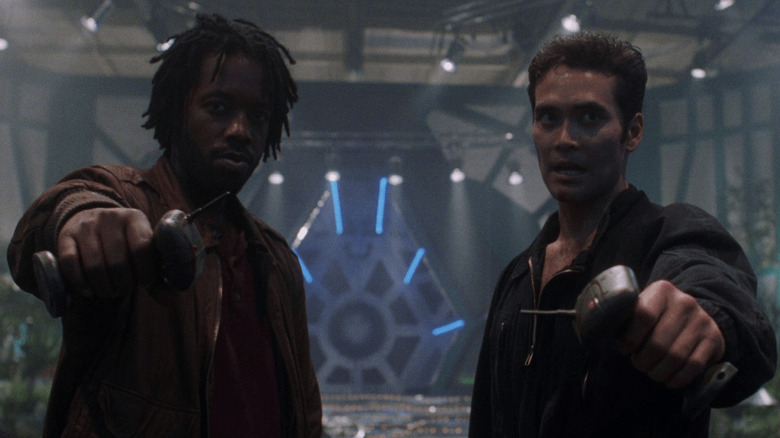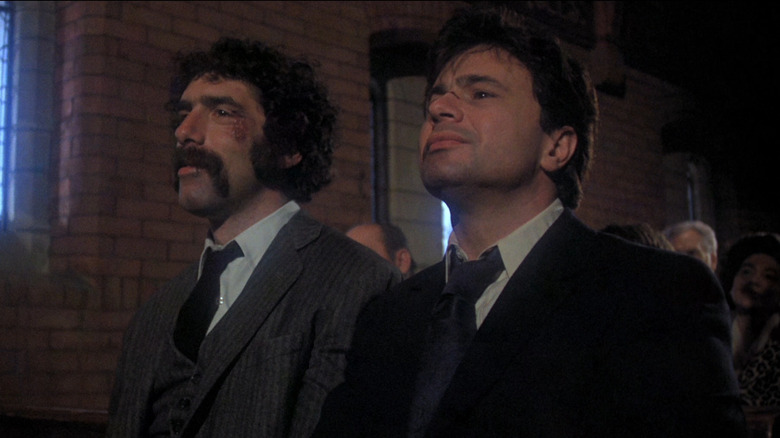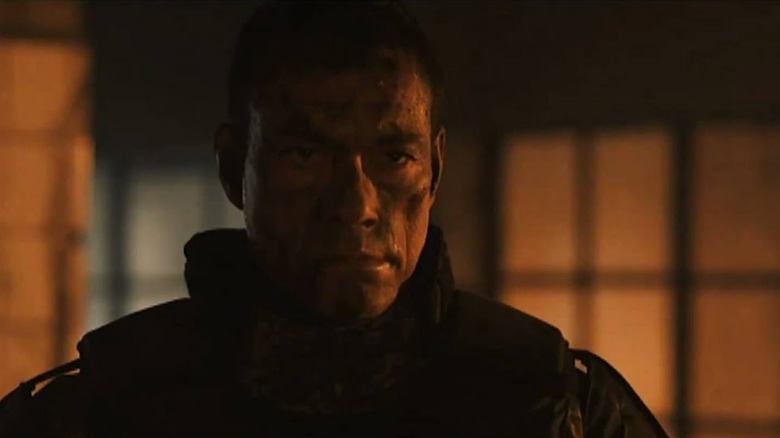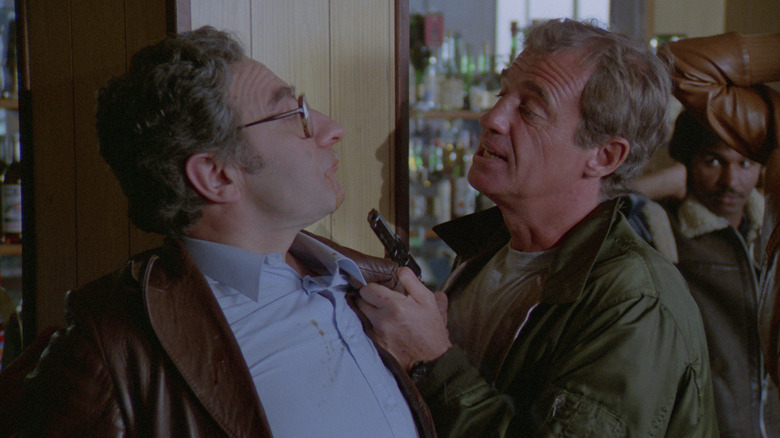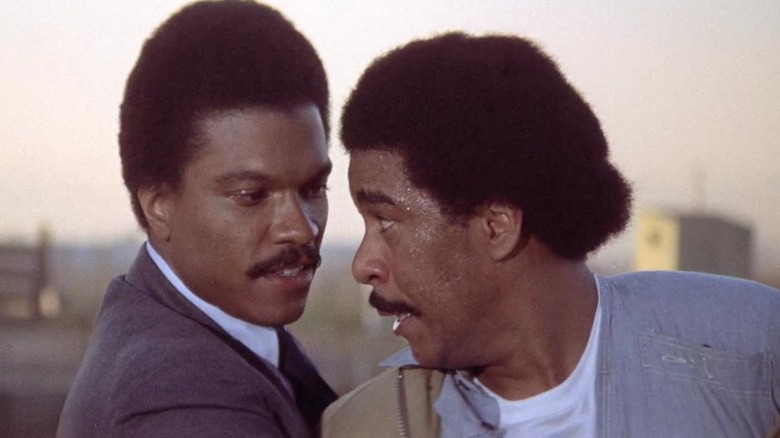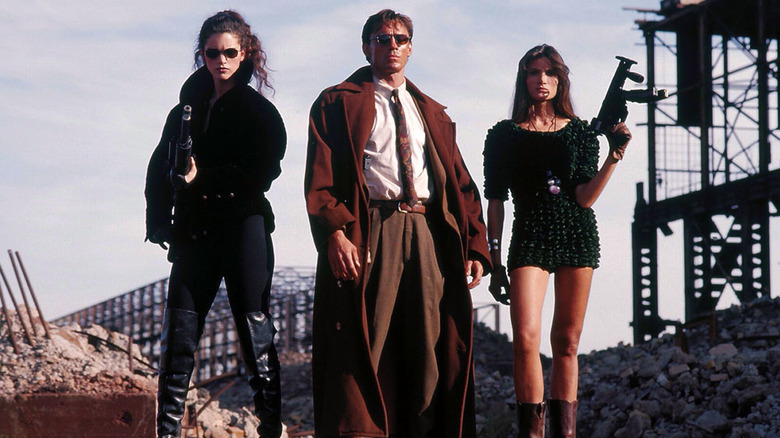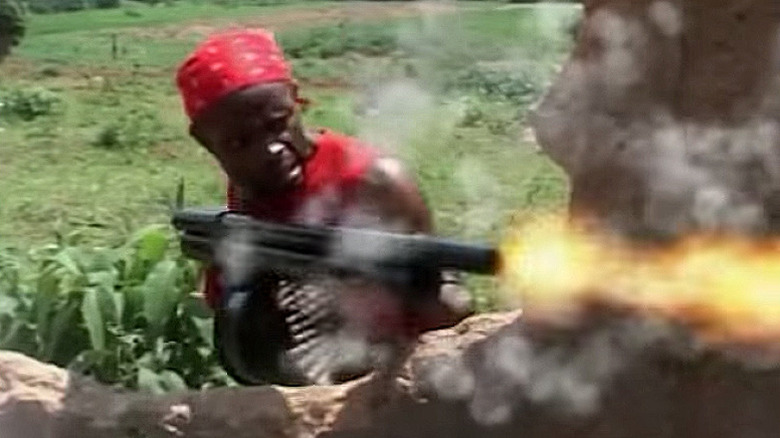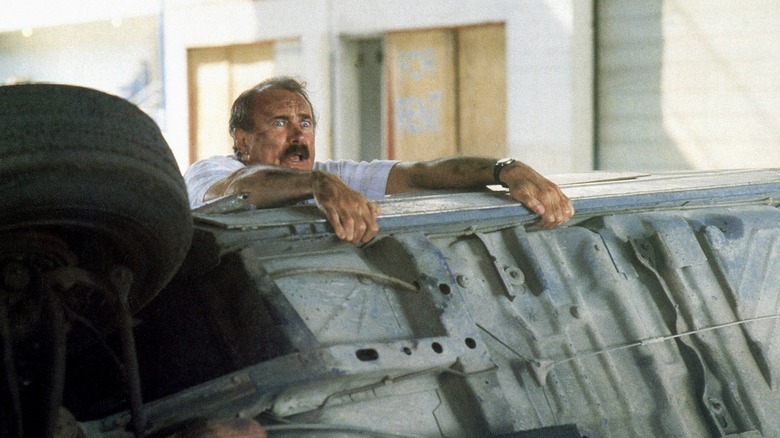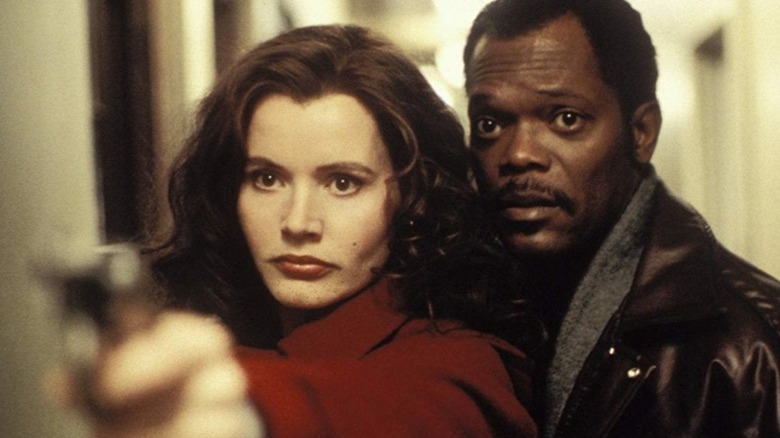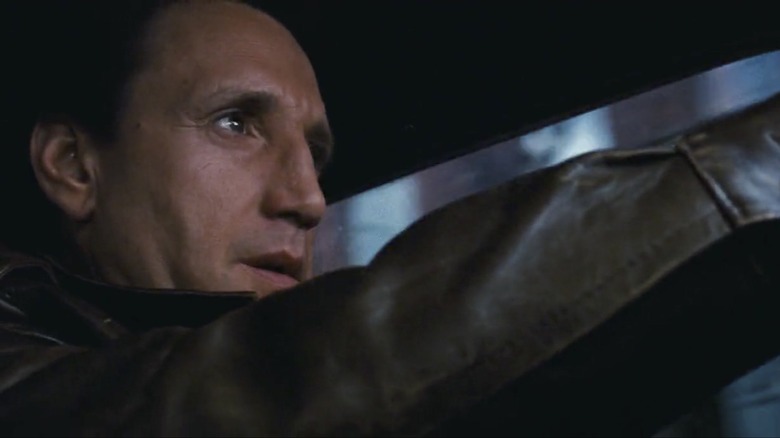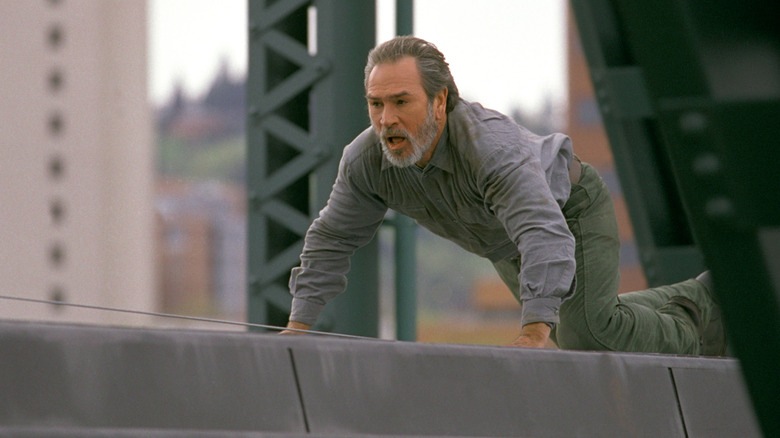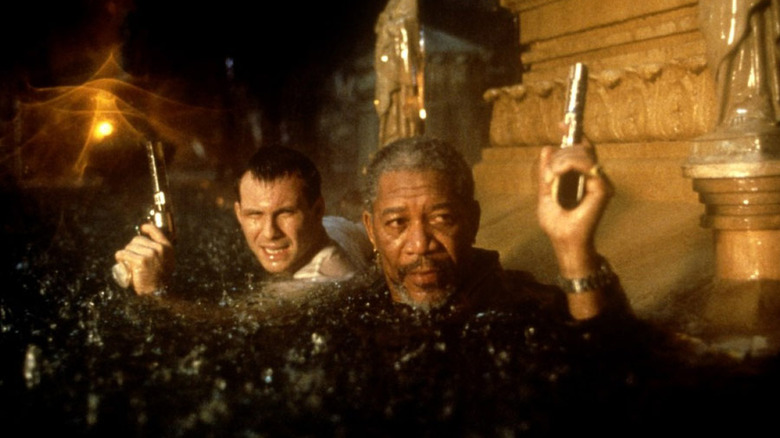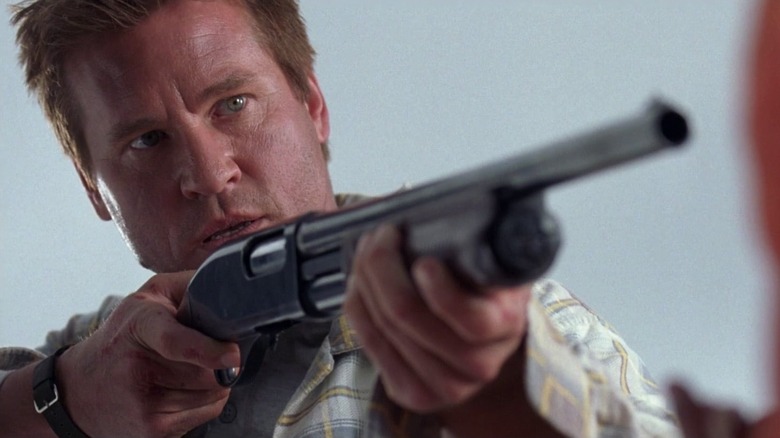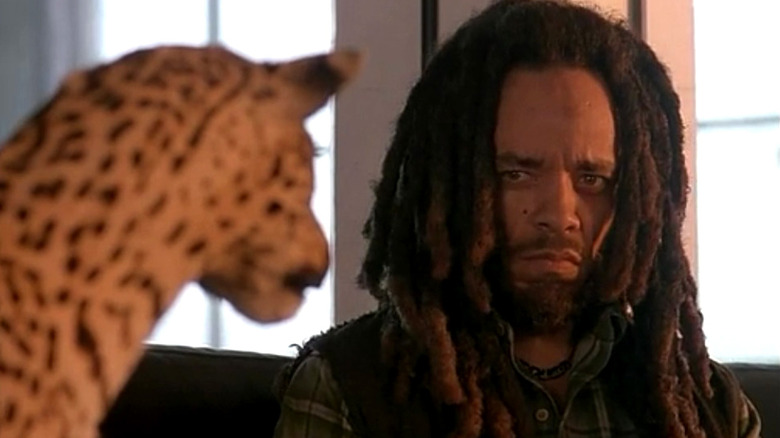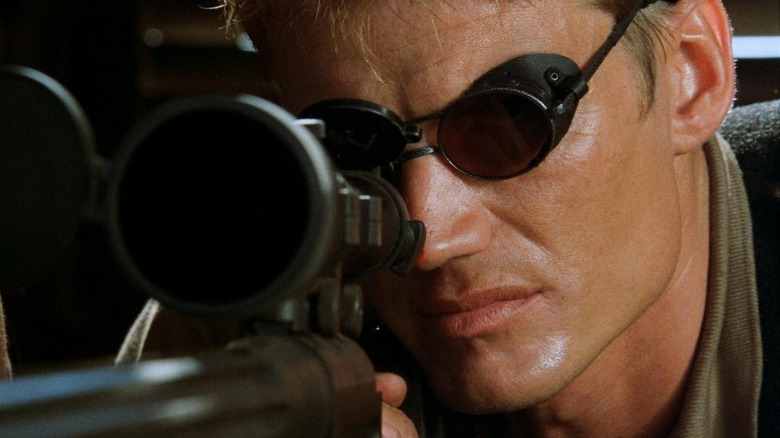15 Underrated Action Movies You Need To Watch
Depending on who you ask, the action genre has either been around since Justus D. Barnes shot the audience in "The Great Train Robbery" or sometime in the 1980s, when car, war, and cop movies took a collective evolutionary step forward. Defining it has only gotten more difficult since, now that every dominant flavor of blockbuster (superhero, space epic, "Fast" and/or "Furious") has at least a little kiss-kiss-bang-bang in the mix. Unlike science fiction or fantasy, there are no monolithic definitions of the form. One of the best and broadest comes courtesy of Jean-Claude Van Damme, one of the most famous faces in the business and the most famous legs: "In an action film, you act in the action."
The following 15 films prove his point one way or another, all in ways deserving of more attention. Some cost entire studios dearly, others were made for the price of a high-end toaster. Vehicular ballets are interspersed with glorified stage plays that happen to include explosions. That's the beauty of action. It can mean just about anything.
And that means there's always more to watch.
Drive
Mark Dacascos has a biological turbocharger implanted in his heart. Should anyone miss the finer points of that procedure — it's explained once and interrupted by a "Leave It To Beaver" joke — the rest of "Drive" doubles as a feature-length context clue. Dacascos moves at Mach 1 and the movie is never more than a step behind.
Dacascos' renegade cyborg (?) and luckless bystander Kadeem Hardison become buddies in record time. The company that owns the tech in his chest abandons its recovery efforts after two skirmishes in favor of sending a newer, faster cyborg to destroy him completely. As Dacascos beats a motel room full of stun guns with a boot on each fist, Hardison chainsaws off a gunman's arm and lets the spinning limb riddle the falling body with bullets. Ordinary TV in this supercharged universe is a sitcom about a frog doctor. The average dive bar is a Hard Rock Café monument to the Apollo program.
On an obviously tight budget, director Steve Wang hotwires a turbocharger of his own. Only takes one punch to feel it buzz in your chest.
Busting
In retrospect, the first theatrical release from writer, director, and eventual cinematographer Peter Hyams plays like the missing link between '70s paranoia thrillers and '80s buddy comedies. When scrappy vice cops Elliott Gould and Robert Blake crack wise, for instance, there's no subliminal laugh track to answer them. Just another shift, a worse detail, and maybe a broken nose from the latest perp who doesn't get the joke.
It's gutter poetry that they hatch their off-duty scheme in a toilet, on a purgatorial stakeout for perverts. If they can just catch local kingpin Allen Garfield in the act, no amount of corrupt bureaucracy or judicial malaise could possibly kill the case. Right? Right?
Every step forward is answered by an equal shove back. Violence always leaves a mark, if not worse; a bravura shootout in a supermarket keeps one eye on a dying butcher. Most loose cannon stories side with the .44 Magnum, but "Busting" makes it poisonously clear that justice is a waste of time on either side of the badge. But bless 'em, they'll try, no matter how many ambulances they have to total.
Universal Soldier: Regeneration
The original "Universal Soldier" was Jean-Claude Van Damme's called shot, an obvious "Terminator" riff for a pretender to Arnold Schwarzenegger's athlete-turned-actor throne. 17 years and a disastrous sequel later, "Universal Soldier: Regeneration" bests the original by giving him an adrenaline-poisoned spectacle that could star nobody else.
His former supersoldier is reintroduced in therapy, almost ready to rejoin civilian society. His first lines, three Rorschach answers — escape, peace, shame — tell a story the craters under his eyes have already covered. He only juices back up because there's nobody left who can do what he does. And boy, can he. The last 20 minutes, in which Van Damme single-handedly infiltrates occupied Chernobyl like a flesh-and-blood cruise missile, roar by with nary a word out of him. His physicality speaks for itself, and it can only scream.
Director John Hyams coaxes career-best work out of stars Van Damme and Dolph Lundgren while effortlessly rewriting the language of American action, all in the guise of a decades-late, direct-to-video sequel to a dead franchise. There are miracles and then there's "Universal Soldier: Regeneration."
Le Marginal
Five years before "Above The Law," Jean-Paul Belmondo cast the Steven Seagal mold in "Le Marginal." He walks the crime-ridden streets of Marseille in a strict dress code of baggy leather jackets and tight blue jeans. The ideal interrogation is held in a dusty dive, seconds before its destruction. Women love him. Superiors hate him. Henry Silva wishes he would just die already.
The crucial difference between Seagal and Belmondo is cool. Even in his prime, Seagal needed help to look it. Belmondo, here a fresh 50, simply is. Within the first 15 minutes, he sprints against highway traffic and leaps onto a speedboat from a pursuing helicopter. Not his stuntman. Not even, for all intents and purposes, his character. Commissioner Phillipe Jordan is merely his latest model of Belmondo supercop. The Ennio Morricone score warns of his unstoppable force like the "Jaws" theme played backwards — instead of here he comes, there he goes. It's not the most novel entry on this list, but it's a singular thrill to see that indestructible smirk behind the wheel of a bulletproof '67 Mustang.
Hit!
"Hit!" is a long fuse with Billy Dee Williams as the slow, sure burn. He's an accomplished agent for some alphabet soup agency, but could care less about promotions — he just wants to destroy the heroin industry that claimed his daughter. When the department refuses the sanction, Williams does it on his own time. Each recruit of his extracurricular squad gets their own tragic connection to the drug trade. Even as our hero charms, coerces, and deceives them to the cause, it's not clear exactly what he needs them for. And that's okay, because Billy Dee is in control.
In a role originally written for Steve McQueen at the height of his powers, Williams is nothing short of magnetic. He may laugh off defeat like a lost game of tag and strike a brotherly bond with frogman Richard Pryor, but he acts with ice in his veins. Using addictions as leverage. Opting for a bazooka when a rifle would've sufficed. It's a smoldering star turn in a smoldering action movie. Director Sidney J. Furie is in no hurry to get to the explosive stuff and that only makes the eventual blast that much more devastating.
Nemesis
Stop me if you've heard this one before. A cop in the near future is shot to sloppy joe and reassembled into a cybernetic being, forever questioning his augmented humanity. During surgery, the feds sneak in a literal ticking time bomb to squeeze One Last Job out of him. Along the way, he must contend with a shotgun-wielding android that, when blown to smithereens, persists as a stop-motion animated endoskeleton.
"Nemesis" may be a box of spare parts, but it's a box of spare parts that B-movie royalty Albert Pyun gator-clamped to a nuclear power plant. Kickboxing champion Olivier Gruner is a man sculpted by the gods to wear big trenchcoats and tiny sunglasses. Guns throw smoke like steam trains and shoot fireworks instead of lead. Nobody runs, jumps, or falls down in this microwaved post-apocalypse — they sprint, front-flip, and plummet through bullet-carved holes in the floor like improvised waterslides. Pyun may get more love for the primordial Van Damme vehicle "Cyborg," but this is his analog hell to beat.
Who Killed Captain Alex?
The assault rifles are taped-up cartoons of PVC pipes and cardboard. The attack choppers are clip-art renderings with actors cropped into the cockpits. The best image quality possible is a bleary DVD rip because writer-director-producer-cinematographer-editor Nabwana I.G.G. needed the hard drive space for his next action epic. None of this matters, not to I.G.G. or his audience. All that matters in "Captain Alex" is raw, relentless entertainment.
There's only one credited kung fu master in the mix, deemed the Ugandan Bruce Lee or "Bruce U" for short, but everybody can hold their own with a spin kick. No chroma-keyed explosion is too overblown, no overlaid muzzle flash too overused. Rival factions march toward an ambush to a twinkly karaoke cover of "Mamma Mia." This is '80s action (I.G.G. cites Chuck Norris and Dolph Lundgren as his heroes) resurrected for $85 and reinvigorated by the go-for-broke Wakaliwood attitude. When VJ Emmie, a "Mystery Theater 3000"-style commentator baked permanently into the soundtrack, shouts "Movie-Movie-Movie!" over footage of a commando log-rolling off a cliff to escape digital dirt charges, it's hard to disagree.
This is what movies were made for.
Short Time
"Short Time" takes the lazy '80s tendency to end comedies as action movies and gives it vibrant, occasionally ghoulish purpose. Dabney Coleman is not a natural action hero. But what would it take, the filmmakers wonder, to make him one?
Early on, he plays a Dabney Coleman type, a detective coasting through his last weeks before retirement. Then a surprise diagnosis reveals those are his last weeks period and insurance only pays out if he dies in the line of duty. To borrow the "Lethal Weapon" dialectic, Murtaugh becomes Riggs overnight.
Coleman's cop, once kept awake by nightmares of his son attending community college, is suddenly flipping double birds in a high-speed pursuit. Between spits into the Grim Reaper's eyeholes, he shops for his own casket and makes himself emotionally available to unaware wife Teri Garr for the first time ever. The action-comedy balance still tips toward the latter, but a blacker kind than its Touchstone sheen suggests. Still, it's a rare pleasure watching a car disintegrate with Dabney Coleman allegedly inside.
The Long Kiss Goodnight
When asked to list his five best movies on a recent Late Show appearance, Samuel L. Jackson, star of 120 movies and counting, did not hesitate with his first choice: "The Long Kiss Goodnight." The man has a point.
"Cliffhanger" director Renny Harlin takes the hard-boiled pulp of "Lethal Weapon" screenwriter Shane Black and blows it up to airport-bestseller scale. But none of the amnesiac twists or rustic torture methods would work without a worthwhile pair of buddies in the middle of it all and this pair is among Black's best, though trio might be more apt. Geena Davis plays Jekyll and knife-throwing Hyde, a proud PTA mom and long-repressed assassin. In a just timeline, the transformation would've earned her a franchise. Instead, it plays out just this once, right in front of cheap P.I. Jackson's constantly wide eyes.
Though "Goodnight" has recuperated a Christmas cult since, its disappointing 1996 release rang a number of death knells. Of Renny Harlin as a speed-dial director. Of Shane Black as a speed-dial writer. But they found new grooves. The most tragic loss of all remains Geena Davis, action hero, here burning bright enough for an entire career.
The Seven-Ups
Fans of "The French Connection" had their choice of follow-up. Anyone hoping for Gene Hackman to finally catch his quarry got "French Connection II," the rare sequel that offers something different and undiminished from its predecessor. Anyone expecting more dirt-under-nail New York police work with Roy Scheider got "The Seven-Ups," an unofficial spinoff and closer creative cousin to the original.
"Connection" producer Philip D'Antoni steps in to direct. Between him and "Shaft" cinematographer Urs Furrer, the city is an overpopulated ghost town. The sky is an overbearing blank. Life exists only in complementary shades of brick and bruise. Somewhere in the rubble, there's a kidnapper. Scheider and his crew want them. At one point he even asks if a low-level hood wants to do things "the easy way or the hard way." The hood knows better. Scheider's only got one speed – mean. He pinches oxygen tubes, trashes antique stores, and rocks every last turtleneck to get his guy. "Connection II" shrewdly avoided car chase comparisons. "The Seven-Ups" drifts into the skid, with a ten minute odyssey that eventually ditches downtown entirely and ends with one of the most violent car accidents committed to celluloid.
The Hunted
In an interview with MovieWeb, director William Friedkin explained "The Hunted" in appropriately mythic terms: "The U.S. is the greatest creator of Frankensteins ever."
The doctor in this story is survivalist Tommy Lee Jones, effectively playing the film's technical advisor. Once upon a time, he trained soldiers to live by the knife. "Once you are able to kill mentally," he promises, "the physical part will be easy." His monster is his finest student, Benicio del Toro, now a haunted Delta Force veteran killing hunters in the Oregon wilderness. The FBI can't track him without Jones. Even if they could, del Toro wouldn't talk to anyone else.
"The Hunted" is as brutally simple as the stone-on-stone blades that Jones teaches his trainees to make. Friedkin and cinematographer Caleb Deschanel paint the woods alien, an all-consuming and impossible shade of green. Unnatural to man, camouflage for whatever these men have become. The action gets bigger — see Jones riding an el train the wrong way above — but never better than the final knife fight between creator and creation.
Hard Rain
In the arithmetic-fueled age of '90s action (bomb plus bus equals $350 million worldwide), "Hard Rain" seems like a can't-miss equation. What do you get when you stage a heist movie in the middle of a disaster movie? $19 million domestic and a lot of "soggy" jokes in the trades.
But "Hard Rain" is better than its non-reputation, and has aged into historical import as one of the last (largely) practical blockbusters. The dam that ultimately washes away the sleepy town of Huntingburg is a 100-foot miniature. Jet skis race down full-sized high school hallways. And then there's the standing water that creeps a little bit higher with each successive scene, turning the "Die Hard"-in-a-hurricane screws and reminding viewers just how miserable it must've been to shoot.
In trying to beat his own math, "Speed" screenwriter Graham Yost provides a missing link between those bomb-plus-bus thrills and the later country-fried crime of "Justified." This doesn't reach the heights of either, but those can't claim the stomach-turning suspense of Christian Slater trying to MacGyver his way out of a flooding jail cell.
Spartan
Somewhere toward the middle of "Spartan," already neck-deep in a conspiracy involving the president's kidnapped daughter, Delta Force instructor Val Kilmer commits a cardinal sin — he talks like an action hero. Cover me. I'll get the girl. Get down. Etc. Anywhere else, it'd be par for the course. In a David Mamet movie, it's a sign of bone-deep weakness, as close as his hard souls come to admitting fear. His squadmate shakes him out of it: "You want to gossip or you want to shoot somebody?"
There's plenty of shooting here, but the rattle doesn't stop when the guns jam. Characters, highly and ambiguously trained all, speak exclusively in jargon, shorthand, and in-jokes we don't have the security clearance to get. They don't talk about what they do; they do. It affords viewers the same amoral advantage as Kilmer: "We don't ask why; that's not a cost, it's benefit." Before long, there are too many questions to stay comfortably ducked and covered. The answers and overriding philosophy double as Mamet's treatise on the genre — think too hard at your own peril.
Surviving the Game
"When you're eating the flesh from the pig," says CIA psychologist Gary Busey as he turns a decapitated hog head toward homeless man Ice-T, "Look into his little, beady eyes." The joke here, besides CIA psychologist Gary Busey, is that there are two dead things at the table and Busey is looking at the other one.
That queasy sense of humor sets this apart from John Woo's bigger, brasher "Most Dangerous Game" adaptation, "Hard Target," released eight months earlier. This is explicitly, often uncomfortably about the Haves and Have-Nots. In the former category, character actor heavyweights Rutger Hauer, Charles S. Dutton, F. Murray Abraham, John C. McGinley, and Busey toe the hammy line between being rich and being insane. To Ice-T, the difference is negligible — he can't afford to question their hospitality either way.
Cinematographer-turned-director Ernest Dickerson keeps the action lean, mean, and music-video pretty. Severed heads of past prey float in jars lit like mad scientist leftovers. At one point, the camera dollies all the way down the barrel of a sniper rifle. If any of it starts to seem outlandish, there's even a built-in defense mechanism — Ice-T can't believe it, either.
Silent Trigger
What if a sniper posted up on the roof of the hotel from "The Shining" and the hotel from "The Shining" was also the skyscraper from "Die Hard"? Such is the irresistibly top-heavy pitch for "Silent Trigger," a direct-to-video curiosity hiding like a landmine in the careers of star Dolph Lundgren and director Russell Mulcahy. It doesn't lean on the former's superhuman physique. It doesn't call for the latter's manic style forged in the fires of Duran Duran music videos and cult canon like "Highlander." By DTV standards of the time, this is downright contemplative.
Lundgren is the world's best shot for the low, low price of his mortal soul. He hesitated once, on a target holding an infant. One more time will earn him a nine-millimeter retirement. High atop the brutalist Algonquin building, there's not much else to do but wait for the next shot and brood over the ill-fated op where he first met spotter Gina Bellman. They also battle a sex pest security guard who hallucinates spiders, but that's more of a detour. What truly matters here is cold concrete, constant rain, and blood squibs the size of cantaloupes.
